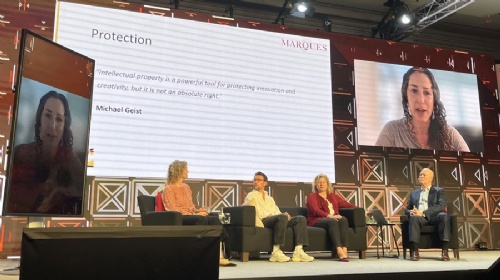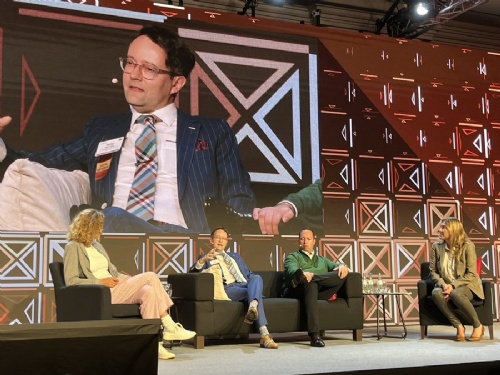Now in its twelfth year, Class 46 is dedicated to European trade mark law and practice. This weblog is written by a team of enthusiasts who want to spread the word and share their thoughts with others.
Click here subscribe for free.
Who we all are...
Annual Conference 2023: Parts 3 and 4
The third part of this year’s MARQUES Annual Conference in Berlin looked at “People Power” – the interaction between brands and consumers.
People power
 The panel took the form of a discussion between two brand owners, a lawyer and an influencer and was chaired by Nick Foot, Sandoz International GmbH, Germany.
The panel took the form of a discussion between two brand owners, a lawyer and an influencer and was chaired by Nick Foot, Sandoz International GmbH, Germany.
Tanya Fickenscher, Major League Baseball, USA described how baseball has gone from radio to having its first fame streamed into a virtual ballpark – something that happened yesterday. Lesley Matty, Mejuri, USA represents a much younger brand and she described how focusing on the digital footprint helps the brand stand out.
Anke Nordemann-Schiffel, Nordemann Czychowski & Partner, Germany said that risks multiply as you have to take account of the consumer response throughout the life of a trade mark, while Paul Schrader, an artist, blogger and influencer explained how direct connections had grown during the pandemic.
The panellists discussed the impact of business trends on trade mark clearance. Anke said it’s necessary to look at clearance more globally: “You have to look at class 9, at services. You will have more potential conflicts as you expand into other classes.” Lesley agreed that as a company grows it bumps against the limits of its risk tolerance: “Everyone is in the same space and on top of each other.”
In this fast-paced world, speed is critical for brand owners – but it has to be balanced with resources. Tanya noted that bigger companies are more risk averse, and added that her sector faces particular challenges: “Baseball is in a fishbowl and can attract unwelcome media attention.”
The panel agreed that trade mark rights are not as absolute as they used to be, as brand owners have to accept a certain amount of input from consumers via social media, which is loud and may be irrational. In practice, when it comes to enforcement, communication is vital. As Tanya said: “Today we are more likely to pick up the phone rather than send a template C&D letter.”
Paul emphasised that brands need a human touch, and that is why influencers are important: they can reach out to new audiences and provoke engagement. But influencers raise their own challenges and the panel asked: have we reached influencer saturation?
One challenge for brands is that the more you engage with consumers the less control you have. That means having a balanced approach and prioritising education. “A long-term connection with trust is the best way to get results. It has to be a good fit,” said Paul.
For brand owners, the key takeaway is to serve the business. As Anke said: “We need to reinvent ourselves and the legal advice we give. We need to be creative and see what kay come.” Other tips the panel offered included: balance reactive and proactive actions; build long term relationships with creatives with trust; consider reviewing advice regularly; be comfortable with challenging the business; and use clients’ budgets effectively.
Brands in a time of crisis
 The final session of the first day looked at brands in a time of crisis, focusing on the challenges – and also opportunities – created by the Covid 19 pandemic as well as other crises such as war, recession and climate change. It was chaired by Tanya Meedom, Elmann IPR Law Firm, Denmark.
The final session of the first day looked at brands in a time of crisis, focusing on the challenges – and also opportunities – created by the Covid 19 pandemic as well as other crises such as war, recession and climate change. It was chaired by Tanya Meedom, Elmann IPR Law Firm, Denmark.
James Brady, Unilever, UK said that, for a global brand owner such as Unilever, there is always a crisis somewhere and the three priorities for brands are authenticity, communication and flexibility. Using the example of Unilever’s Lifebuoy soap brand during the pandemic, he showed the importance of clear and consistent communication, credibility and flexibility, including co-branding within the portfolio, entering new categories with existing brands and partnerships with other companies.
Tapio Blanc, F. Hoffmann-La Roche AG, Switzerland explained how Covid spurred the pharmaceutical industry to develop new products at unimaginable speed. “We had to take risks. The path was not straightforward,” he said; “We were building the plane while it was flying.” Innovations for Roche included collaborations with competitors and others in the industry and the use of the house mark rather than a brand on Covid-19 test kits. Tapio also described how Roche had responded to the war in Ukraine, by focusing on moral responsibility, health and safety and realistic profit expectations.
Building on this, communication expert Astrid Haug, SoMe, Denmark discussed the lessons from Carlsberg’s experience of withdrawing from Russia. She stressed that crises are risky for brands, and more responsibility is put on them: “Companies are expected to take a big role. You have to be ahead of the curve. Regulation is often behind public opinion.
Also, as the speakers agreed, in a crisis time speeds up and you can easily be accused of responding too slowly, particularly if you don’t manage expectations. “It’s always good to over-communicate,” said Astrid.
The MARQUES Annual Conference continues until Friday this week.
Posted by: Blog Administrator @ 06.40Tags: Annual Conference, Berlin, crisis,


 Sharing on Social Media? Use the link below...
Sharing on Social Media? Use the link below...Perm-A-Link: https://www.marques.org/blogs/class46?XID=BHA5215

